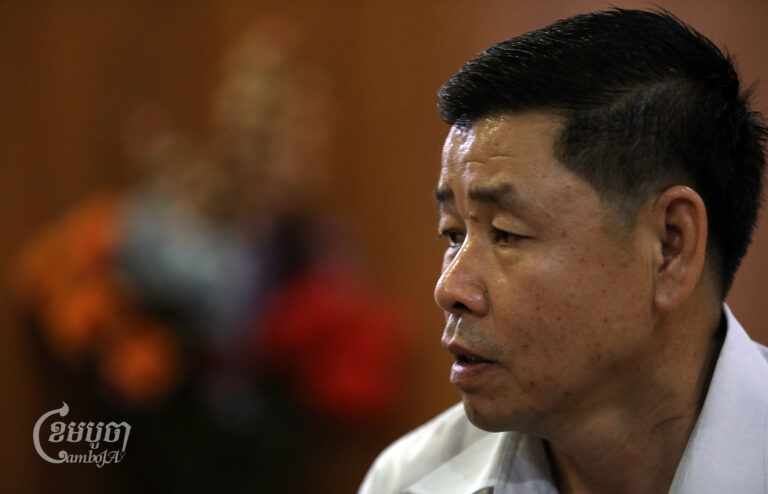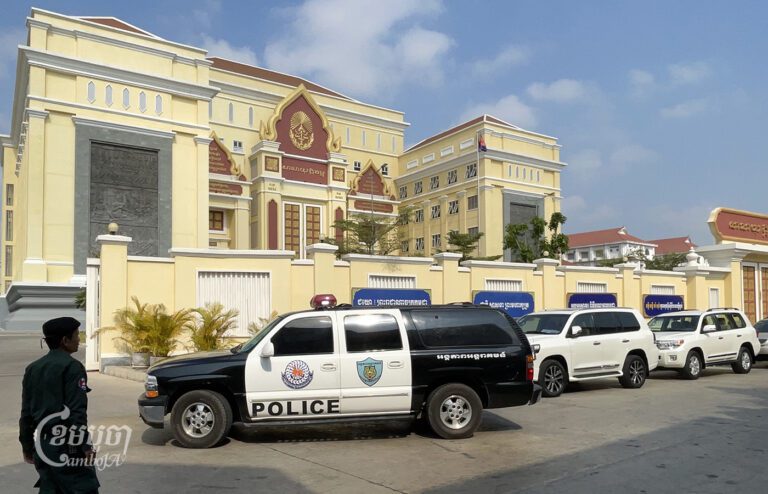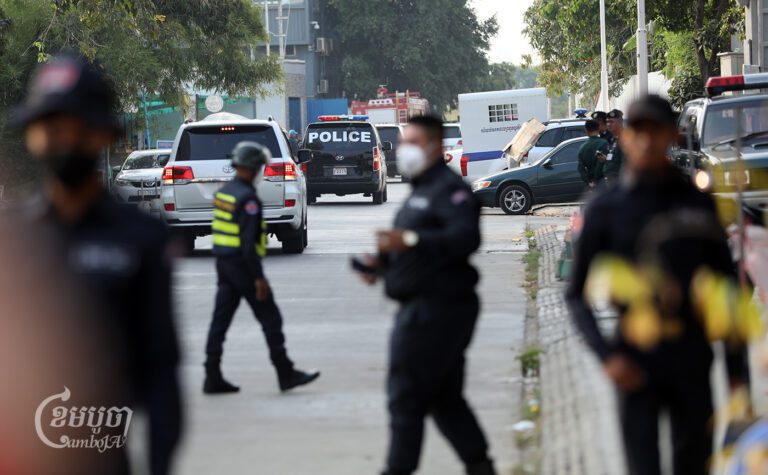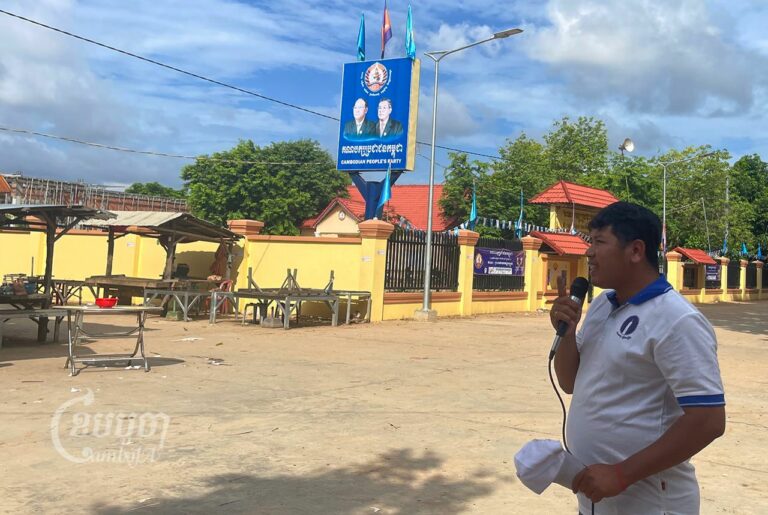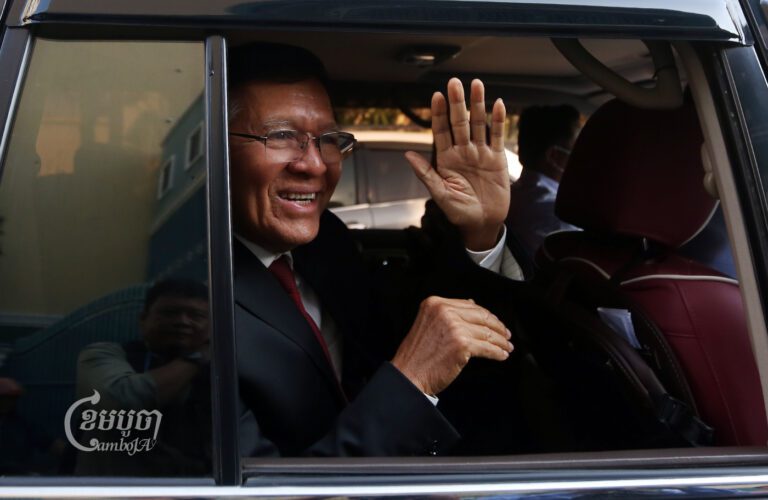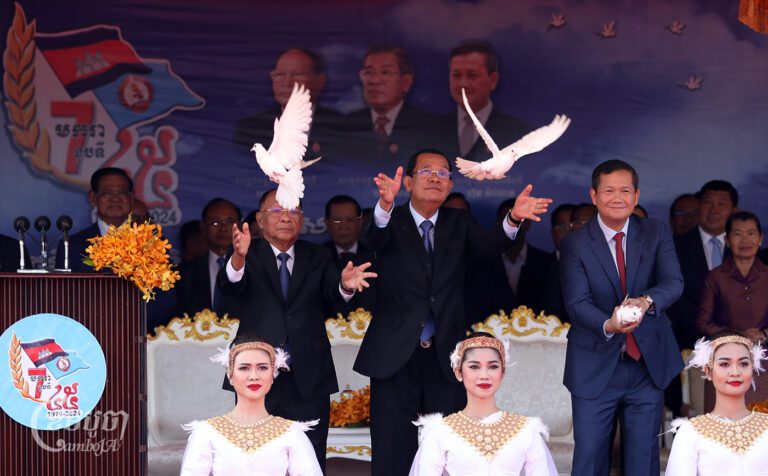The families of imprisoned activists of the court-disbanded Cambodia National Rescue Party (CNRP) beseeched the US embassy for help Friday in arranging the release of the activists on bail, pointing to fears of a COVID-19 outbreak in the prison where the CNRP members are being held.
Cheng Sreyny, 37, wife of former CNRP activist Ton Nimol, imprisoned in Prey Sar Prison’s CC1 facility, said she and the other family members, who have organized loosely as the “Friday Women” to protest weekly for the release of their husbands, had submitted a petition to the US embassy requesting their help in advocating with the Cambodian government.
“We submitted the petition with the US embassy because we want our husbands released on bail because we are concerned about COVID-19 spreading in the prison where inmates are crowded,” said Sreyny, adding that she had been told by the prison that her husband had tested positive for the disease and was quarantined from other inmates. She said wants her husband released on bail for treatment because he has other health problems such as eye disease.
Sreyny and the other family members have maintained the innocence of their imprisoned kin, whose party was forcibly dissolved at the order of the Supreme Court in 2017. The targeting of the CNRP coincided with growing restrictions on independent media and the consolidation of the government into a de facto single-party state around the ruling Cambodian People’s Party (CPP).
Prum Chantha, wife of activist Kak Komphea, was also among the petitioners and told CamboJA that embassy staff said they would pass the information to US Ambassador Patrick Murphy.
“I’m so worried about COVID-19 spreading in the prison and if they have any problems with [the virus],” she said, adding that life has been difficult for her family since her husband’s imprisonment.
A spokesperson from the US embassy confirmed by email that staff had a letter today from representatives of the CNRP families.
“We continue to urge the Cambodian government to drop all charges against peaceful activists, respect basic human rights as guaranteed by the Cambodian Constitution, and re-open political and civic space,” the embassy said in its response to CamboJA.
Chin Malin, spokesman of the Ministry of Justice, said the activists could request whatever they wanted but said the prison sentences of the CNRP members had been determined by the courts.
“This is the court’s decision, so the embassy does not have power to interfere with the decision of the court in the sovereign state,” said Malin.
Sam Sokong, a lawyer who has defended most of the imprisoned activists, said he hadn’t received any information about his clients’ COVID-19 status, as the prison has banned visitors.
“Both my clients’ family members and I do not receive enough information from the prison officials whether they are infected or not with COVID-19,” Sokong said.
“Most of them were detained for more than one year, so they were detained for the maximum sentence,” Sokong said, adding that the incitement charge most of the activists are in prison for is a minor crime.
He said the government should facilitate meetings between lawyers and their clients, even if only by telephone, to update them about their cases or health status.
“We have a plan to file a complaint asking the court to release our clients on bail next week,” Sokong said, explaining they would ask the court to release all activists of the former CNRP.
Nuth Savna, spokesman of the General Department of Prisons, didn’t provide much detail about the COVID-19 patients in prisons, saying only that 34 inmates of Preah Sihanouk provincial prison, 18 inmates of Prey Sar’s CC1 and 106 inmates of the Kandal provincial prison had tested positive for the virus.
“If the community had a problem [of COVID-19 infection], the prison also had a problem too,” said Savna, adding that inmates who test positive for the virus are isolated for treatment.
He said nearly 10,000 inmates of Prey Sar’s CC1 and CC2 facilities, as well as PJ Prison in Phnom Penh, were inoculated with their second dose of vaccine on Thursday. The prison department and health officials have a plan to vaccinate all inmates of Kandal provincial prison, Savna said.
According to a UN statement issued Friday, the body had begun providing humanitarian support to the Cambodian prisons at the request of the prison department.
Since May 27, the UN has provided materials including personal protective equipment, rapid antigen test kits, and vitamin supplements for 10,000 inmates. The UN will be contributing more equipment on June 1, the statement read.
“The authorities need to take urgent steps to minimize the threat posed by the virus to those in detention,” the statement urged, suggesting the release to alternative facilities of a “wide range of categories of prisoners, namely pre-trial detainees, women with accompanying children, those with pre-existing medical conditions and non-violent offenders.”
Cambodia’s prisons are notoriously overcrowded, with just two of the nation’s 28 prisons running below capacity, according to data from rights group Licadho. Eighteen of the prisons are severely overcrowded, with occupancy at more than 300 percent. Prey Sar’s CC1, the country’s largest prison, holds around 7,700 inmates, or 376 percent of its capacity. Late last year, rights groups Licadho, Amnesty International, and Human Rights Watch called for better protections for the country’s 40,000 detainees, at least a third of whom are being held in pre-trial detention.
Am Sam Ath, deputy director of Licadho, said he hasn’t received official information about the inmates who had tested positive for the virus besides the basic numbers of cases.
“We have difficulty receiving information about COVID-19 infection in the prison,” Sam Ath said.
Sam Ath said that civil society has provided recommendations for safer prisons since the pandemic began last year, pointing to overcrowding as an issue.
“The government or relevant institutions should not prolong [criminal cases] and especially the court should review and consider this issue,” Sam Ath said.



